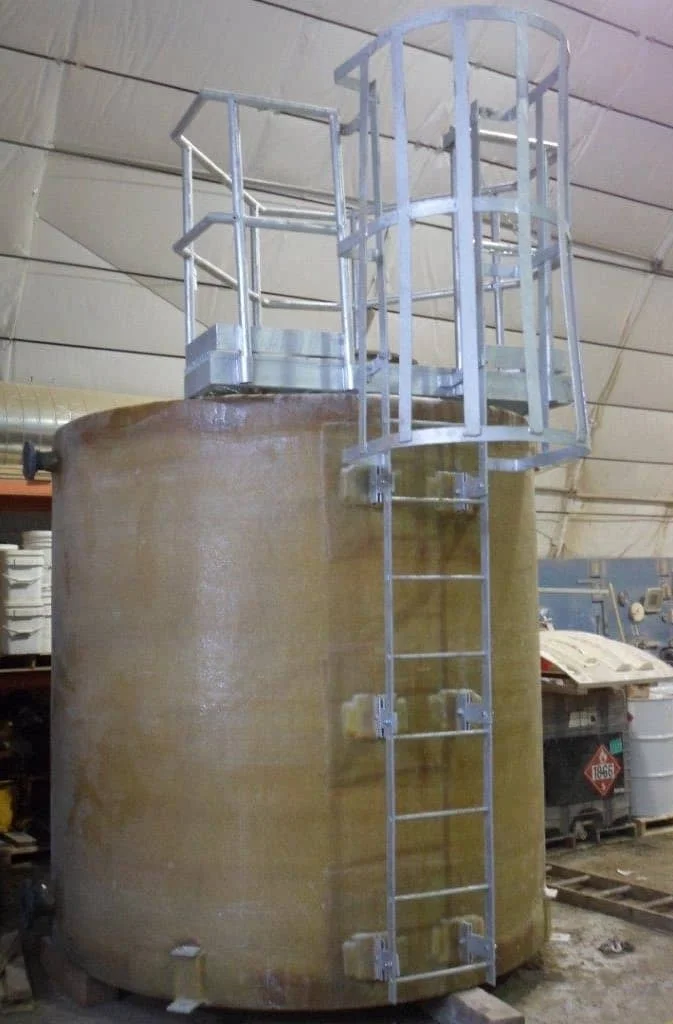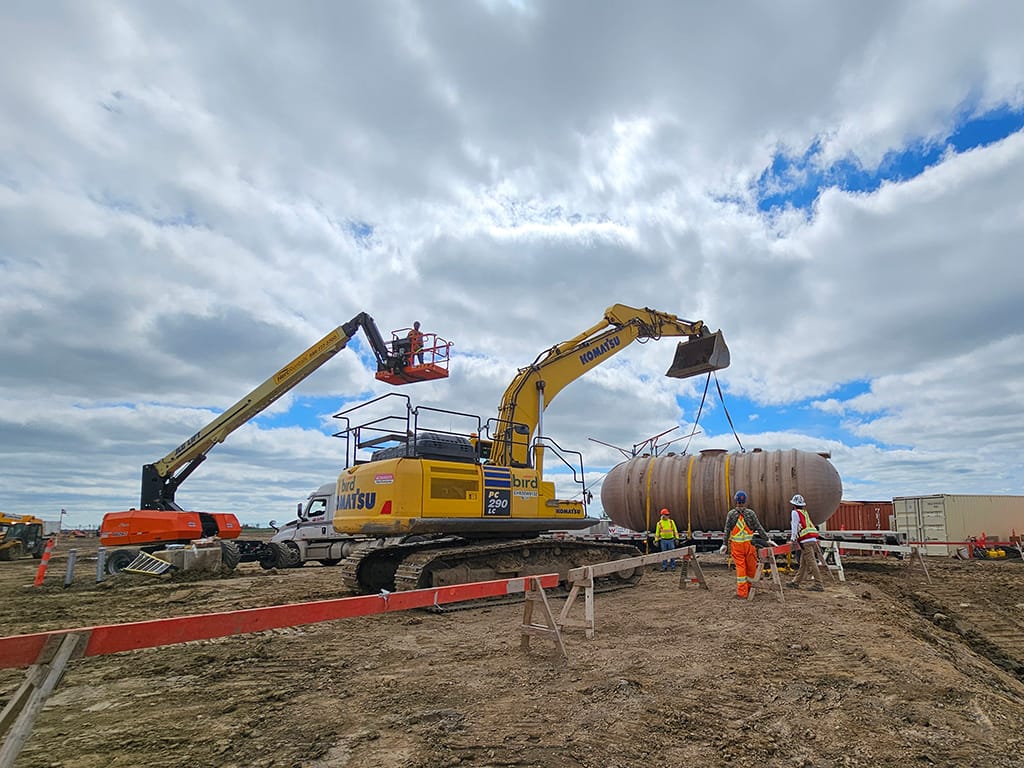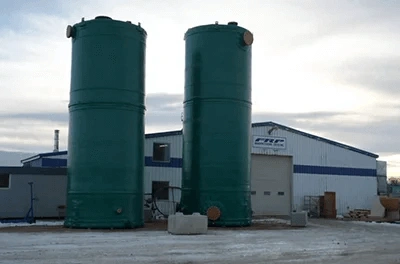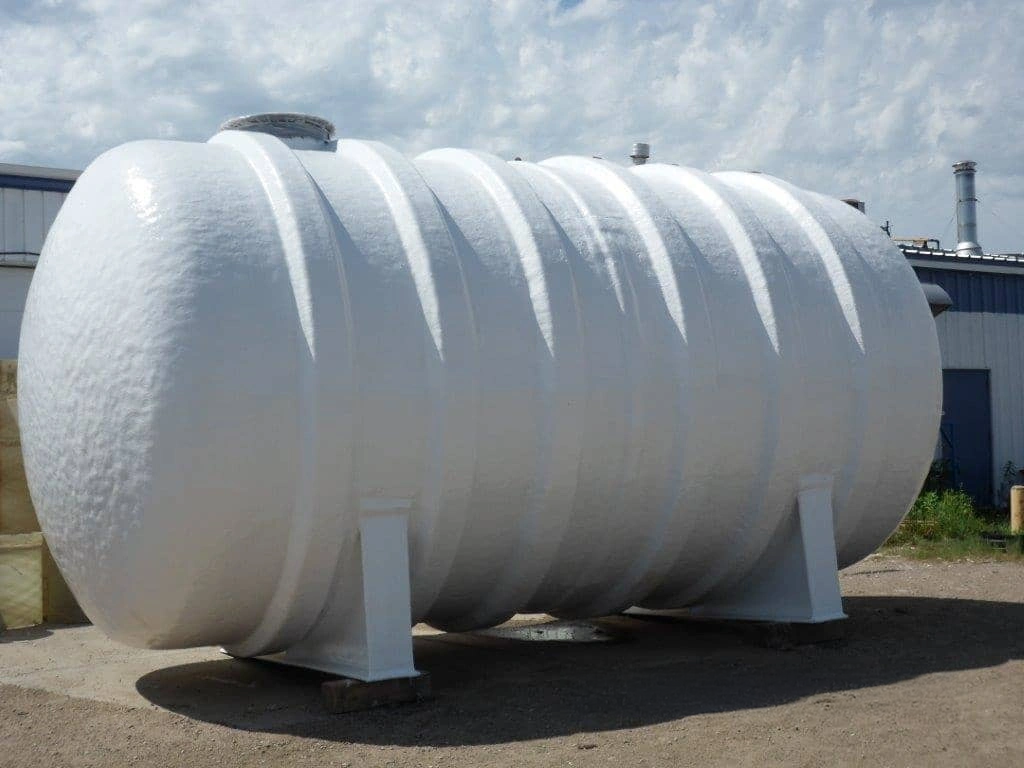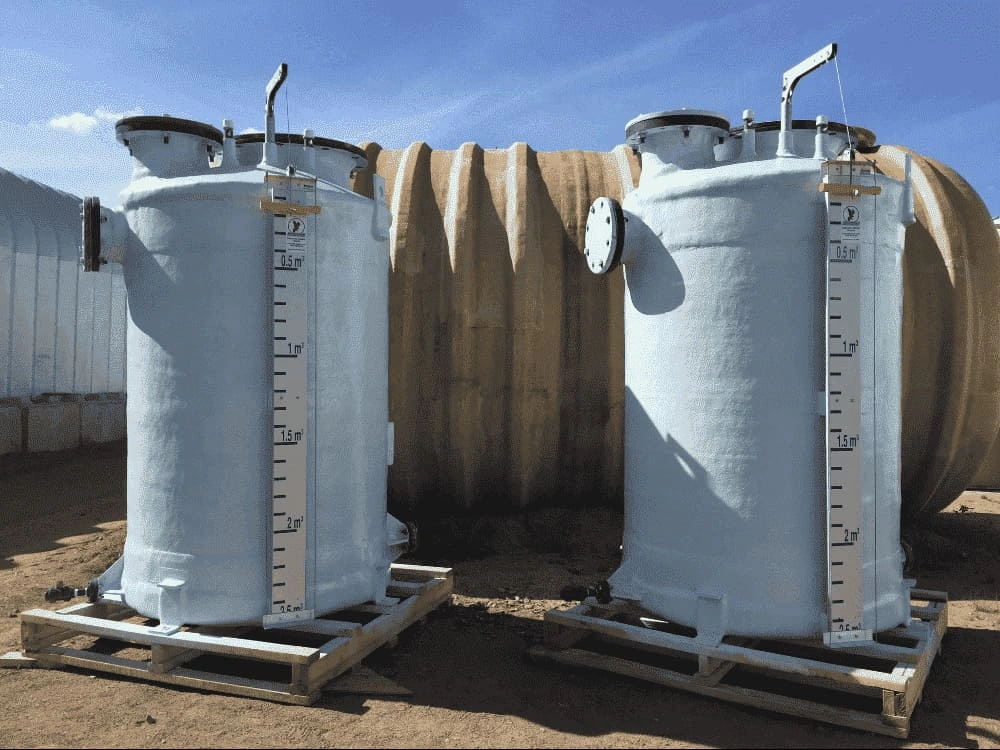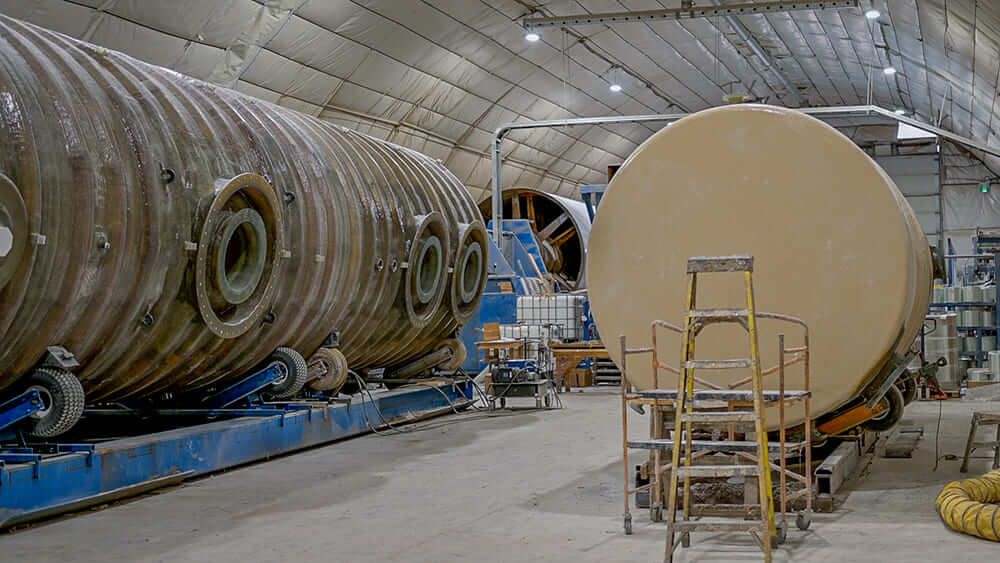Fiberglass Reinforced Plastic (FRP) tanks have steadily evolved, becoming a cornerstone of storage solutions across numerous industries. Initially developed for the petroleum sector, these tanks have proven their worth far beyond fuel storage. Their versatility, lightweight structure, and unparalleled resistance to corrosion have made FRP applications critical in areas ranging from water treatment to agriculture.
This article discusses the various applications, benefits, and industries that utilize fiberglass plastics, providing an in-depth understanding of their growing popularity.
Understanding the Core Advantages of FRP Applications
The widespread adoption of FRP applications stems from several inherent benefits:
- Corrosion Resistance: FRP materials excel in handling corrosive chemicals, ensuring long-term durability without the risk of rust or degradation. This makes them ideal for storing liquids such as acids, fertilizers, and wastewater.
- Lightweight Yet Sturdy: FRP tanks are significantly lighter than steel or concrete tanks, making transportation and installation more manageable while maintaining structural integrity.
- Customizable Design: FRP applications are highly adaptable. Tanks can be manufactured in various sizes, shapes, and configurations to meet the specific needs of different industries.
- Fire Resistance: Built to withstand extreme conditions, many FRP tanks include fire-retardant properties, enhancing safety in volatile environments.
- Low Maintenance: The non-porous interior surfaces of FRP tanks prevent the buildup of residues, making cleaning easier and reducing maintenance costs over time.
- Cost-Effectiveness: While the initial investment may be higher, the reduced need for repairs and replacements makes FRP applications an economical choice in the long run.
Applications of FRP Tanks
The versatility and durability of FRP tanks have made them indispensable across a wide range of industries. Here, we dive deeper into their most common and emerging applications, showcasing how FRP applications are transforming storage and operational efficiencies worldwide.
Fuel and Petroleum Industries
From the outset, FRP tanks were designed to meet the demanding needs of the petroleum sector. Their corrosion-resistant properties make them ideal for storing crude oil, gasoline, diesel, and other petroleum products.
- Fire Resistance: FRP tanks are equipped with fire-retardant materials, ensuring safety in volatile environments.
- Non-Conductive: Unlike metal tanks, FRP tanks do not conduct electricity, reducing the risk of sparking and fire hazards.
- Long-Term Durability: Petroleum storage often requires extended periods of containment, and FRP tanks provide the longevity necessary to minimize wear and tear.
- Low Maintenance Costs: Their ability to withstand corrosion and extreme temperatures reduces the frequency of costly repairs or replacements.
Potable Water Storage
FRP tanks are an excellent choice for storing drinking water due to their hygienic and non-reactive properties.
- Safe and Clean Storage: The non-corrosive nature of FRP tanks ensures water remains uncontaminated over time, even in challenging environmental conditions.
- Perfect for Remote Locations: In areas where access to clean water is limited, FRP tanks provide a dependable solution for storing and distributing potable water.
- Customizable Sizes: Whether for small community needs or municipal water storage, FRP tanks can be tailored to fit any capacity requirements.
- Long-Term Investment: With minimal risk of leaks or contamination, these tanks offer a cost-effective solution for water storage.
Fertilizer and Agricultural Chemical Storage
In agriculture, safe storage of fertilizers and pesticides is crucial to protect the environment and maintain operational efficiency.
- Corrosion Resistance: Fertilizers and pesticides are often highly corrosive, but FRP tanks can handle these substances with ease.
- Environmentally Friendly: The leak-proof design of FRP tanks minimizes the risk of hazardous substances leaching into the soil or water systems.
- Lightweight and Portable: Farmers benefit from the mobility of FRP tanks, which can be relocated as needed without heavy equipment.
- Custom Design: FRP tanks can include features like reinforced linings for added safety when storing highly reactive substances.
Wastewater Treatment and Management
In wastewater treatment facilities, FRP tanks are critical for handling and processing sewage, effluents, and industrial waste.
- Resistance to Corrosive Materials: Wastewater often contains chemicals and contaminants that corrode traditional materials, making FRP tanks a superior choice.
- Long-Lasting Performance: Their durability reduces the need for frequent replacements, even in the harshest environments.
- Adaptability: FRP tanks can be customized to include compartments or separators for multi-stage wastewater treatment processes.
- Environmental Protection: Their leak-proof design prevents contamination of surrounding soil and groundwater, making them an environmentally conscious choice.
Food and Beverage Industry
The food and beverage sector demands strict adherence to hygiene and safety standards, and FRP applications excel in meeting these requirements.
- Storage of Liquids: From brine and vinegar to syrups and fruit juices, FRP tanks ensure that stored products remain untainted.
- Bacteria-Resistant Surfaces: The smooth interior surfaces of FRP tanks prevent bacterial growth, making them ideal for food-grade applications.
- Temperature Resistance: Certain beverages and food ingredients require specific storage temperatures, and FRP tanks can be insulated or equipped with temperature control systems.
- Compliance with Regulations: FRP tanks are designed to meet FDA and other regulatory standards for food and beverage storage.
Chemical Processing and Storage
FRP tanks are essential for the chemical industry, offering unparalleled resistance to the harsh conditions often encountered in this sector.
- Handling Corrosive Chemicals: Acids, alkalis, and solvents can easily degrade traditional storage materials, but FRP tanks withstand these substances without compromise.
- Custom Linings: Depending on the chemicals being stored, FRP tanks can include specialized linings for additional protection.
- Flexibility in Design: FRP tanks can be manufactured to store a wide variety of chemicals, ensuring safety and efficiency in chemical plants.
- Leak-Proof Design: Minimizing the risk of leaks is crucial when dealing with hazardous chemicals, and FRP tanks excel in this regard.
Mining and Metal Processing
The mining industry operates in some of the harshest environments, and FRP tanks are designed to meet these challenges head-on.
- Durable Under Pressure: Whether storing acidic leachates or mining effluents, FRP tanks maintain their structural integrity under extreme conditions.
- Resistance to High Temperatures: Metal processing often involves high heat, and FRP tanks can be equipped to handle elevated temperatures without deformation.
- Corrosion Resistance: Exposure to chemicals and moisture in mining environments makes corrosion resistance a top priority, and FRP tanks deliver.
Aquaculture Applications
In aquaculture, maintaining a safe and healthy environment for aquatic life is paramount, and FRP tanks are a top choice.
- Non-Toxic Materials: FRP tanks are constructed from materials that do not release harmful chemicals into the water, ensuring the safety of fish and other aquatic organisms.
- Ease of Cleaning: The smooth, non-porous surfaces of FRP tanks make them easy to clean and sanitize, reducing the risk of disease outbreaks.
- Durable and Long-Lasting: FRP tanks withstand constant exposure to water and UV light, ensuring reliable performance over time.
- Customizable Features: Tanks can be fitted with dividers, aeration systems, and other features to optimize aquaculture operations.
Pulp and Paper Industry
The pulp and paper industry relies on various chemicals and solutions that require safe storage, and FRP applications provide the ideal solution for this need.
- Resistance to Harsh Chemicals: FRP tanks are used to store substances like sodium hydroxide and chlorine dioxide, which are common in paper production.
- Operational Efficiency: Their lightweight design allows for easy transportation and installation, even in remote locations.
- Corrosion-Free Storage: This ensures that the quality of the stored chemicals is maintained without contamination.
Renewable Energy Sector
As the world shifts toward renewable energy, FRP tanks are playing an increasing role in storing biofuels, solar thermal fluids, and other materials associated with green energy initiatives.
- Eco-Friendly Manufacturing: Many FRP tanks are produced using processes that align with the sustainability goals of the renewable energy industry.
- Adaptability: Tanks can be designed for new and emerging storage needs within renewable energy projects.
- Long Lifespan: Their durability ensures that renewable energy facilities can rely on FRP tanks for decades.
Design and Customization
Size and Capacity
Shape and Orientation
Depending on space constraints or operational needs, FRP tanks can be fabricated in various shapes and orientations, such as:
- Vertical or horizontal tanks for space optimization.
- Cylindrical or rectangular shapes to fit within specific layouts.
Additional Features
Manufacturers can incorporate advanced features, including:
- Heating or cooling systems for temperature-sensitive materials.
- Reinforced linings for storing highly reactive chemicals.
- Integrated monitoring systems are designed to enhance safety and optimize operational efficiency.
Specialized Coatings
The Environmental Benefits of FRP Applications
Reduced Waste
Leak Prevention
Energy Efficiency
Conclusion: The Unmatched Potential of FRP Applications
Fiberglass Reinforced Plastic tanks have revolutionized storage solutions across industries, offering a combination of durability, flexibility, and cost-efficiency. From their origins in the petroleum sector to their widespread use in agriculture, water treatment, and beyond, FRP applications continue to grow in importance.
With their customizable designs, environmental benefits, and ability to withstand extreme conditions, FRP tanks are a forward-thinking choice for businesses looking to optimize their operations. Whether you need a potable water tank for a rural community or a specialized storage solution for hazardous chemicals, FRP applications provide unmatched versatility and reliability.
If you’re ready to explore how FRP tanks can transform your storage needs, contact FRP Mocoat today to discover the best solutions for your business.

